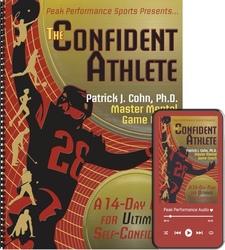
Why are Extremely High Expectations Detrimental to Peak Performance?
There are many misnomers regarding “expectations.” To understand the impact of high expectations, it is important to examine the term. Here’s where the confusion lies.
Some athletes equate the term “expectations” with the belief that something will or will not happen. In this sense, the thought process is, “If expecting to lose leads to losing, shouldn’t expecting to win bring about winning?”
Belief is crucial to peak play as long as you stay immersed in the moment and do not worry about the end result. Where expectations are particularly detrimental is when they are excessive or when they are associated with demands.
Excessive expectations refer to setting unrealistic, unattainable, or overly high standards for yourself. For example, “I need to win every tournament” or “I should never strikeout.”
These are impossible standards that place overwhelming pressure on you to perform. When those expectations are not met, you feel disappointed and frustrated, causing you to feel like a failure.
Processing extremely high expectations requires several steps:
- Redefining Success – Success isn’t just about wins, trophies, and stats; it’s also about improvement, consistency, and overcoming challenges.
- Managing External Pressure – Coaches, family, and media may have high expectations for you, but you don’t need to buy into those expectations. Stay focused on pursuing PERSONAL and REALISTIC goals.
- Focusing on Controllables – Instead of stressing over results (winning every game or never messing up), concentrate on your effort, preparation, game plan, and execution.
From an early age, Madison Keys was told she would be a future World No. 1. Keys turned pro on her 14th birthday, and, in her debut, Keys defeated world No. 81, Alla Kudryavtseva in straight sets.
However, as her career progressed, Keys fell short in her attempts to win a Grand Slam event, with defeats in one final, five semifinals. and four quarterfinals.
The high expectations were an extremely tough burden for Keys.
KEYS: “I felt like from a pretty young age, I felt like if I never won a Grand Slam, then I wouldn’t have lived up to what people thought I should have been. That was a pretty heavy burden to carry around.”
Once Keys processed those excessive expectations and challenged her beliefs, she was able to alleviate the pressure and play like she knew she was capable of playing.
KEYS: “It just kind of forced me to look at myself in the mirror a little bit and try to work on the internal pressure that I was putting on myself… I finally got to the point where I was OK if it didn’t happen. I didn’t need it to feel like I had a good career or that I deserved to be talked about as a great tennis player.”
With less pressure, Keys beat Aryna Sabalenka 6-3, 2-6, 7-5 at the 2025 Australian Open to win her first Grand Slam championship.
Managing expectations is necessary for all athletes to enable them to play freely, enjoy the game, and play to the height of their abilities.
Managing high expectations requires that you know their origins and how they hold you back from playing at your peak.
Are expectations your own or ones you adopt from others? Define the specific expectations in the form of shoulds… For example, “I should not make mistakes.”
Next, set aside your expectations and instead focus on smaller objectives such as to commit to each play call or commit to your tactics.Recognizing and overcoming unrealistic expectations helps reduce pressure and leads to stable confidence.
Related Sports Psychology Article
- How to Boost Confidence by Managing Expectations
- Pressure is Self-Induced by Expectations
- Fear of Meeting Other’s Expectations and Pressure
The Confident Athlete (Digital Download)

“The Confident Athlete” audio and workbook program helps you feel confident before you walk onto the field, track or court. You discover how to have stable and proactive confidence so you can think like a champion.
“I just finished ‘The Confident Athlete Program.’ Improving confidence is a never-ending process. I think that confidence boosting is an awesome area. Having a daily mental plan for mental “work outs” can turbo charge anyone’s confidence level…. Studying almost all of Dr. Cohn’s mental game materials gives me a real EDGE over my competitions and most importantly – a boost in my daily life.”
~Radek Sefcik, Peak Performance Sports Customer

